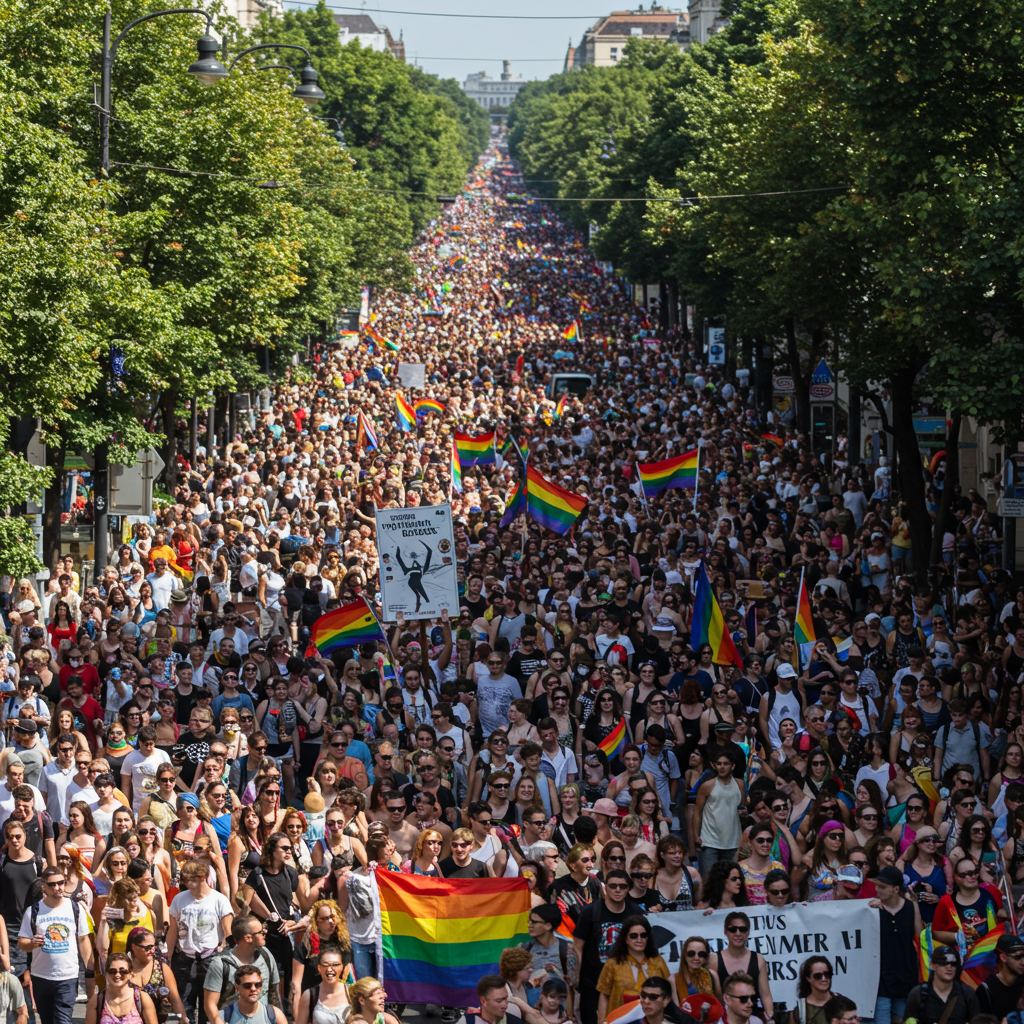A performance by British punk-hip-hop duo Bob vylan at the Glastonbury Festival has ignited a major controversy. During their set on June 28, 2025, on the West Holts stage, one half of the duo, Bobby Vylan, led the crowd in controversial chants. The immediate aftermath saw swift condemnation from high-profile figures and organizations, including the UK Prime Minister, the Glastonbury Festival organizers, and the BBC. The band has also faced significant professional repercussions, including being dropped by their agency and having their US visas revoked. Amidst the fallout and a police investigation, Bobby Vylan has publicly stood by his statements. This incident highlights the volatile intersection of music, politics, and global conflict on major cultural platforms.
Who Are Bob Vylan?
Bob Vylan is a dynamic duo hailing from Ipswich, England. The group consists of two members known by pseudonyms: Bobby Vylan and Bobbie Vylan. They adopt these stage names to shield themselves from potential surveillance, according to reports. Formed in 2017, their music is a potent fusion of punk and hip-hop styles. This blend often incorporates elements of hard rock as well. Their lyrics are fiercely political and confrontational. They tackle difficult subjects like racism, police brutality, homophobia, and the rise of far-right politics. Songs such as “Pulled Pork” critique law enforcement actions. Other tracks like “England’s Ending” include direct and provocative statements about the British monarchy. Their outspoken nature quickly established them within the UK punk scene. By 2022, Bobby Vylan noted that the band had become impossible to ignore. Their impactful work has earned them significant accolades. These include Best Alternative Act at the MOBOs and Best Album at the Kerrang Awards in 2022. Bobby Vylan has a background rooted in political activism. He reportedly attended his first pro-Palestine protest as a teenager. The duo has consistently voiced strong opinions regarding the conflict in Gaza. They have also been critical of other artists perceived as not showing enough solidarity with the cause. Their rise underscores their willingness to use their platform forcefully.
The Glastonbury Performance and Controversial Chants
The incident at Glastonbury occurred during Bob Vylan’s scheduled performance. Taking the stage on June 28th, Bobby Vylan engaged directly with the large festival audience. He spoke about the situation in Gaza before launching into controversial chants. The initial chant was “Free Palestine.” This was followed by the highly provocative chant, “Death, death to the IDF.” The IDF refers to the Israel Defense Forces. Vylan prefaced these chants with statements justifying the strong language. He remarked on the “strange reaction” faced by people supporting Palestine. He stated that anyone with a moral compass could see the tragedy unfolding in Gaza. He dedicated the subsequent song to artists using their voices for advocacy. He also made a striking comment about communication methods. He suggested that sometimes violence is necessary to convey a message. He stated this is because it is “the only language that some people speak, unfortunately.” This statement was later highlighted in the press. It further intensified the debate surrounding his performance. The performance was part of the BBC’s extensive live coverage of the festival. This live broadcast, initially aired with a language disclaimer, became a focal point of the subsequent controversy.
Swift and Widespread Backlash Ensues
The response to Bob Vylan’s Glastonbury set was immediate and severe. Condemnation poured in from various influential quarters. The controversy quickly moved beyond the music world into the political sphere.
UK Government Condemnation
UK Prime Minister Keir Starmer was among the first prominent figures to react. He issued a strong statement condemning the band’s chants. Starmer described the remarks as “appalling hate speech.” He insisted there was “no excuse” for such language. He explicitly referenced the Irish rap group Kneecap in his comments. Starmer had previously criticized Kneecap’s pro-Palestine stance and their planned Glastonbury appearance. He reiterated that performers making threats or inciting violence should not be given a platform. Starmer also directed criticism towards the BBC. He publicly questioned how the controversial scenes came to be broadcast live. This put immediate pressure on the national broadcaster.
Glastonbury Festival’s Stance
Glastonbury Festival organizers also swiftly distanced themselves from the chants. They issued their own statement on June 29th. The festival acknowledged the band’s presence but condemned the specific language used. They stated that Bob Vylan’s chants had “very much crossed a line.” The statement emphasized the festival’s core values. It declared there is “no place at Glastonbury for antisemitism, hate speech, or incitement to violence.” Organizers stressed they were reminding production staff and others involved about this policy. Emily Eavis, one of the festival organizers, reiterated this stance. She clarified that hosting an artist does not imply endorsement of their views. With nearly 4,000 performances, she noted, differing opinions are inevitable. However, the specific chants were deemed unacceptable.
BBC’s Handling and Regret
The BBC faced significant scrutiny for live streaming the set. The broadcaster initially aired the performance online with a warning. This warning noted the use of “very strong and discriminatory language.” However, this was deemed insufficient by many critics, including Equalities Minister Jacqui Smith. Smith called the BBC’s initial response “not good enough.” She argued they should have cut the live feed immediately. Dorothy Byrne, a former Channel 4 news executive, commented on the technical feasibility. She stated that stopping the broadcast would have been possible. She also questioned the BBC’s pre-show research into the band’s known political stance. The BBC later issued a statement expressing “deep regret.” They admitted they “should have pulled the stream during the performance.” They acknowledged the chants contained “deeply offensive” and “antisemitic” sentiments. The BBC declared these sentiments “utterly unacceptable” and having “no place on our airwaves.” They removed the performance footage from their on-demand services. The broadcaster also announced a review of its guidelines for handling live events. This review aims to ensure clarity on when problematic content should be taken off air.
Significant Consequences for the Duo
The fallout from the Glastonbury performance quickly translated into tangible consequences for Bob Vylan. The band’s career and future plans were significantly impacted.
One major repercussion was their reported separation from their representation. According to reports, Bob Vylan was dropped by United Talent Agency (UTA). Their profile page was no longer visible on the agency’s website. This suggests a swift and decisive action by their management.
The band also faced international travel restrictions. Christopher Landau, the US Deputy Secretary of State, announced a severe measure. He tweeted that Bob Vylan’s US entry visas had been revoked. Landau cited their “hateful tirade at Glastonbury” as the reason. He specifically mentioned them leading “death chants.” He stated that foreigners who “glorify violence and hatred are not welcome visitors to our country.” This decision has direct implications for the band’s scheduled US tour dates. They were reportedly set to begin a tour in October. These plans will now be disrupted or cancelled.
Furthermore, the controversial performance triggered a domestic legal response. UK police launched a criminal investigation into the band. This was confirmed on June 30th. Authorities are reportedly reviewing footage from the set. The goal is to determine if any criminal offenses were committed under UK law. This adds a serious legal dimension to the artistic and political controversy.
Bob Vylan’s Response: Standing Firm
Despite the intense backlash and professional setbacks, Bobby Vylan has remained defiant. He publicly addressed the controversy on social media. On June 30th, he posted on Instagram. His caption simply read, “I said what I said.” This phrase indicated a refusal to retract or apologize for his statements made on stage.
He paired this comment with a personal reflection. He shared a story about his daughter’s school survey. The survey reportedly asked for suggestions regarding meals. His daughter proposed healthier options and dishes inspired by different cultures. Vylan used this anecdote to pivot to a broader message about youth and activism. He stated that it is “incredibly important” to empower future generations. He urged people to “pick up the torch that was passed to us.” He elaborated on ways to advocate for change. He mentioned “marching in the streets,” “campaigning on ground level,” and “organizing online.” Crucially, he included “shouting about it on any and every stage that we are offered.” This final point directly contextualized his actions at Glastonbury. He framed his controversial performance as a form of necessary activism on a prominent stage. He implied that discomfort or controversy is an acceptable price for delivering a political message.
Context: The Kneecap Parallel
The controversy surrounding Bob Vylan did not occur in isolation. It happened shortly after another group faced similar issues related to their pro-Palestine stance. The Irish rap trio Kneecap was also scheduled to perform at Glastonbury. The BBC had already decided not to broadcast Kneecap’s set live. This decision followed criticism, including from Keir Starmer. Starmer had stated that Kneecap’s appearance was “not appropriate” due to previous controversial comments.
Kneecap had also faced repercussions for their political expression elsewhere. Their US visas were reportedly revoked following anti-Israel comments made during their set at the Coachella festival. Furthermore, one member of Kneecap, Mo Chara (real name Liam O’Hanna), is facing a terrorism offense charge in the UK. This charge relates to allegedly displaying a Hezbollah flag at a London show and making supportive remarks. Hezbollah and Hamas are proscribed terrorist organizations in the UK. O’Hanna and Kneecap have denied supporting these groups and have described the incident as a joke or political policing. The overlapping controversies involving Bob Vylan and Kneecap underscore a broader tension. This tension exists between artistic expression, political advocacy, and the boundaries set by festivals, broadcasters, and governments in the current geopolitical climate.
Frequently Asked Questions
What controversial statements did Bob Vylan make at Glastonbury?
During their June 28, 2025 performance, Bob Vylan’s Bobby Vylan led the crowd in chants of “Free Palestine” followed by “Death, death to the IDF” (Israel Defense Forces). He also stated that sometimes “violence” is necessary to convey a message, as it’s the only language some people understand. These specific chants and comments sparked the widespread backlash.
Which organizations and officials condemned Bob Vylan’s performance?
Several prominent entities and individuals condemned the set. These included UK Prime Minister Keir Starmer, who called it “appalling hate speech.” Glastonbury Festival organizers issued a statement saying the chants “very much crossed a line.” The BBC expressed “deep regret” for live streaming the set, calling the sentiments “antisemitic” and “utterly unacceptable.” US Deputy Secretary of State Christopher Landau also condemned the “hateful tirade.”
What consequences did Bob Vylan face after the Glastonbury set?
Following the performance, Bob Vylan faced significant repercussions. They were reportedly dropped by their US management agency, United Talent Agency (UTA). The US government, via Deputy Secretary of State Christopher Landau, revoked their entry visas, impacting their planned US tour. Additionally, UK police launched a criminal investigation into footage of the performance to determine if any offenses were committed.
Conclusion
The Bob Vylan incident at Glastonbury represents a confluence of music, politics, and intense public debate. The band’s decision to use a major festival stage for explicit political chants, including “Death to the IDF,” triggered immediate and forceful condemnation from political leaders, festival organizers, and broadcasters. The swift professional consequences, from agency representation to international travel bans and a police investigation, highlight the severe ramifications artists can face for controversial political expression in this climate. While Bob Vylan’s Bobby Vylan has unapologetically defended his actions as necessary activism, framing it as inspiring future generations, the event has sparked broader discussions about free speech, hate speech, and the responsibilities of platforms like Glastonbury and the BBC. The parallel case involving Kneecap underscores that this is part of a wider pattern of musicians facing scrutiny and consequences for taking strong stances on the Israel-Palestine conflict. The fallout from Bob Vylan’s set is likely to continue shaping conversations about the role of artists in political discourse and the boundaries they face.
References
- www.cbsnews.com
- www.theguardian.com
- www.hollywoodreporter.com
- news.sky.com
- <a href="https://www.lemonde.fr/en/global-issues/article/2025/06/30/uk-pm-condemns-death-to-the-idf-chants-at-glastonbury-festival6742841199.html”>www.lemonde.fr




